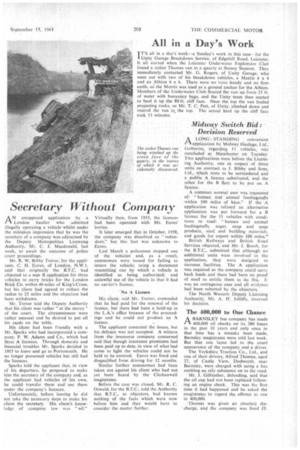Secretary Without Company A N unopposed application by a London haulier
Page 47

If you've noticed an error in this article please click here to report it so we can fix it.
who admitted illegally operating a vehicle whilst under the mistaken impression that he was the secretary of a company was adjourned by the Deputy Metropolitan Licensing Authority, Mr. C. J. Macdonald, last week, to await the outcome of police court proceedings.
Mr. R. W. Bibby Trevor, for the applicant, C. H. Eaves, of London, N.W.1, said that originally the B.T.C. had objected to a ne,w B application for three vehicles to carry bricks for the London Brick Co. within 40 miles of King's Cross, but his client had agreed to reduce the radius to 25 miles and the objection had been withdrawn.
Mr. Trevor told the Deputy Authority that his client was rather "at the mercy of the court. The circumstances were rather unusual and he desired to put all his cards on the table.
His client had been friendly with a Mr. Sparks who had incorporated a company, F. W. Adams and Co., which had three A licences. Through domestic and financial troubles Mr. Sparks decided in 1955 to leave and go to Portsmouth. He no longer possessed vehicles but still had the licences.
Sparks told the applicant that, in view of his departure, he proposed to make him the secretary of the company and, as the applicant had vehicles of his own, he could transfer them and use them under the company's licences.
Unfortunately, before leaving he did not take the necessary steps to make his client the secretary. His client's knowledge of company law was "nil." Virtually then, from 1955, the licences had been operated with Mr. Eaves' lorries.
It later emerged that in October, 1958, the company was dissolved as " redundant," but this fact was unknown to Eaves.
Last March a policeman stopped one of the vehicles and, as a result, summonses were issued for failing to insure the vehicle; using a document resembling one by which a vehicle is identified as being authorized; and unlawful use of the vehicle in that it had no carrier's licence.
No A Licence His client, said Mr. Trevor, contended that he had paid for the renewal of the licence, but there had been a hold-up in the L.A.'s office because of the proceedings and he could not produce an A licence.
The applicant contested the issues, but his defence was not accepted. A witness from the insurance company concerned said that though insurance premiums had been paid up to date, in view of what had come to light the vehicles could not be held to be covered. Eaves was fined and disqualified from driving for 12 months.
Similar further summonses had been taken out against his client who had not yet been heard by the Clerkenwell magistrates.
Before the case was closed, Mr. R. C. Oswald, for the B.T.C.. told the Authority that B.T.C., as objectors, had known nothing of the facts which were now before him and they would have to consider the matter further.




































































































































